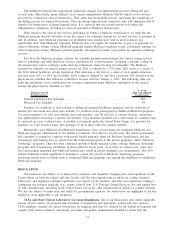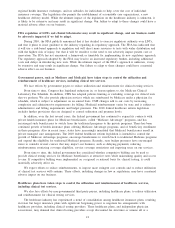Quest Diagnostics 2010 Annual Report Download - page 24
Download and view the complete annual report
Please find page 24 of the 2010 Quest Diagnostics annual report below. You can navigate through the pages in the report by either clicking on the pages listed below, or by using the keyword search tool below to find specific information within the annual report.regional health insurance exchanges, and tax subsidies for individuals to help cover the cost of individual
insurance coverage. The legislation also permits the establishment of accountable care organizations, a new
healthcare delivery model. While the ultimate impact of the legislation on the healthcare industry is unknown, it
is likely to be extensive and may result in significant change. Our failure to adapt to these changes could have a
material adverse effect on our business.
FDA regulation of LDTs and clinical laboratories may result in significant change, and our business could
be adversely impacted if we fail to adapt.
During 2010, the FDA publicly announced that it has decided to exercise regulatory authority over LDTs,
and that it plans to issue guidance to the industry regarding its regulatory approach. The FDA has indicated that
it will use a risk-based approach to regulation and will direct more resources to tests with wider distribution and
with the highest risk of injury, but that it will be sensitive to the need to not adversely impact patient care or
innovation. The FDA has not announced a framework or timetable for implementing its new regulatory approach.
The regulatory approach adopted by the FDA may lead to an increased regulatory burden, including additional
costs and delays in introducing new tests. While the ultimate impact of the FDA’s approach is unknown, it may
be extensive and may result in significant change. Our failure to adapt to these changes could have a material
adverse effect on our business.
Government payers, such as Medicare and Medicaid, have taken steps to control the utilization and
reimbursement of healthcare services, including clinical test services.
We face efforts by government payers to reduce utilization and reimbursement for clinical testing services.
From time to time, Congress has legislated reductions in, or frozen updates to, the Medicare Clinical
Laboratory Fee Schedule. In addition, CMS has adopted policies limiting or excluding coverage for clinical tests
that we perform. We also provide physician services which are reimbursed by Medicare under a physician fee
schedule, which is subject to adjustment on an annual basis. CMS changes add to our costs by increasing
complexity and administrative requirements for billing. Medicaid reimbursement varies by state and is subject to
administrative and billing requirements and budget pressures. The 2010 federal healthcare reform legislation
includes further provisions that are designed to control utilization and payment levels.
In addition, over the last several years, the federal government has continued to expand its contracts with
private health insurance plans for Medicare beneficiaries, called “Medicare Advantage” programs, and has
encouraged such beneficiaries to switch from the traditional programs to the private programs. There has been
continued growth of health insurance plans offering Medicare Advantage programs, and of beneficiary enrollment
in these programs. Also in recent years, states have increasingly mandated that Medicaid beneficiaries enroll in
private managed care arrangements. The 2010 federal healthcare reform legislation is intended to control the
growth of Medicare Advantage programs, encourage beneficiaries to switch back to traditional Medicare programs
and expand the eligibility for traditional Medicaid programs. Recently, state budget pressures have encouraged
states to consider several courses that may impact our business, such as delaying payments, reducing
reimbursement, restricting coverage eligibility, service coverage restrictions and imposing taxes on our services.
From time to time, the federal government has considered whether competitive bidding can be used to
provide clinical testing services for Medicare beneficiaries at attractive rates while maintaining quality and access
to care. If competitive bidding were implemented on a regional or national basis for clinical testing, it could
materially adversely affect us.
We expect efforts to reduce reimbursements, to impose more stringent cost controls and to reduce utilization
of clinical test services will continue. These efforts, including changes in law or regulations, may have a material
adverse impact on our business.
Healthcare plans have taken steps to control the utilization and reimbursement of healthcare services,
including clinical test services.
We also face efforts by non-governmental third party payers, including healthcare plans, to reduce utilization
and reimbursement for clinical testing services.
The healthcare industry has experienced a trend of consolidation among healthcare insurance plans, resulting
in fewer but larger insurance plans with significant bargaining power to negotiate fee arrangements with
healthcare providers, including clinical testing providers. These healthcare plans, and independent physician
associations, may demand that clinical testing providers accept discounted fee structures or assume all or a
21
























